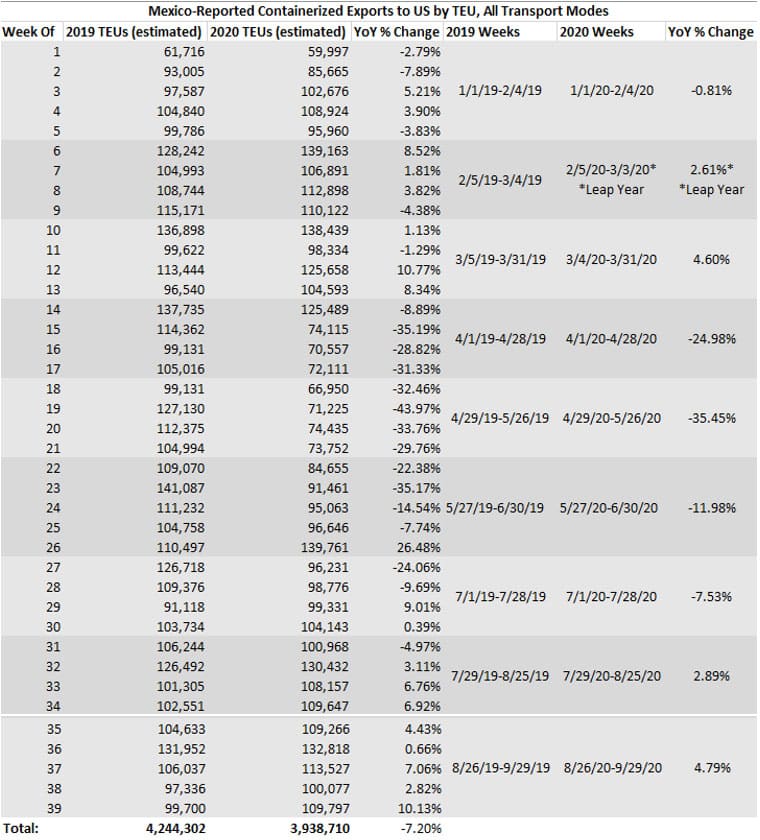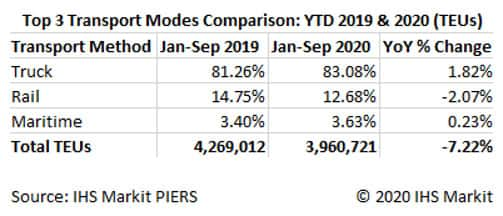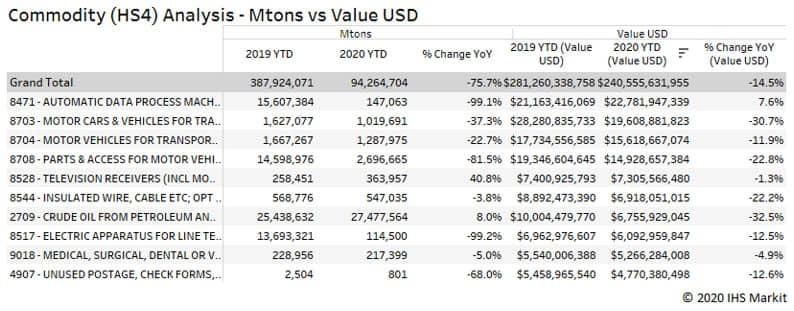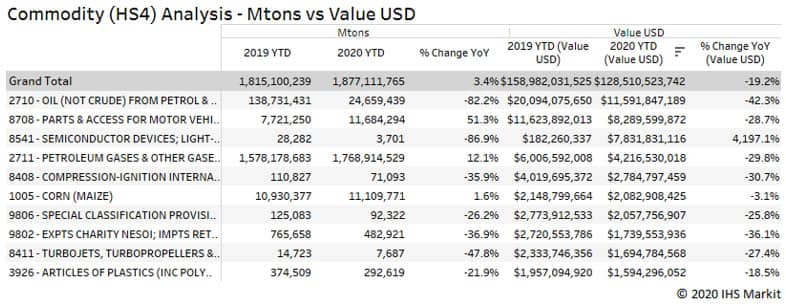Customer Logins
Obtain the data you need to make the most informed decisions by accessing our extensive portfolio of information, analytics, and expertise. Sign in to the product or service center of your choice.
Customer Logins
BLOG
Nov 04, 2020
Charting the COVID Pandemic Effects on International Trade November 2020
US-Mexico cross-border trade via Mexico customs bill of lading data

Source: IHS Markit PIERS
Mexico Customs bill of lading (BOL) data allows us to track US-Mexico cross-border trade using all transport modes such as truck, rail, maritime, pipeline and air. With data now available through September 2020 (week 39), we can continue to monitor rates of COVID-19 disruption and recovery YTD 2020 compared to 2019.
Mexico didn't impose large-scale quarantines until the last week of March 2020 (week 13) so export volumes were relatively flat through week 13 even as the quarantines affected trade for many other countries of the world. However, the export contraction reflected significantly in April 2020 (weeks 14-17) and worsened into May 2020 (weeks 18-21), with recovery signs reflecting in June 2020 (weeks 22-26) and July (weeks 27-30).
August (weeks 31-34) reflected the first month since March for which year-on-year growth in TEU exports was observed (2.89% growth) compared to the same period in 2019. Weeks 32-39 showed growth in the 0-10% range. In fact, in week 39, the last week in September, exports grew at the strongest rate (10.13%) since week 26 (26.48% growth), the last week in June. However, as recently as week 36, growth was flat (0.66%), showing inconsistent recovery.
Mexico-Reported Containerized Exports to US by TEU, all transport modes

Source: IHS Markit PIERS (Note only complete calendar weeks charted)
Comparing month-over-month trends, the downward trend is apparent in Mexico's TEU export volumes for the months of April and into May, with consistent export performance June-September. Notably, February, March, August and September represent the only months representing year-over-year growth in 2020 thus far.
Mexico-Reported Containerized Exports to US by TEU, all transport modes

Source: IHS Markit PIERS
Mexico-Reported Containerized Exports to US by TEU, all transport modes

Source: IHS Markit PIERS
Most cross-border containerized goods are moved by truck (~83%), followed by rail (~12.5%) then maritime (~4%), with little change year-on-year even throughout the pandemic disruption.
Analyzing the same period using metric tons (MTONs), which contains cargos both containerized and non, we can quantify the beginning of the recovery, disproportionately affecting different industries and their companies. The first 34 weeks of the year showed a 16.2% decrease by total value in USD.
Mexico-Reported Total Exports to US by MTONs, all transport modes

Source: IHS Markit PIERS
By USD value, the top five Mexico export commodities are in the areas of data processing machines, motor vehicles and parts, and crude oil. Exports of passenger vehicles (HS 8703) fell 30.7% year-on-year. Automatic data process machines (HS 8471) grew 7.6% year-on-year for the same comparison period.
Crude oil (HS 2709) export volumes increased 8.0% MTONs year-on-year 2019 to 2020, but the crash in crude oil prices globally resulted in a decline of 32.5% by value.
Mexico carries a trade surplus with the US, exporting more than it imports from its neighbour. For the first 39 weeks of the year, Mexico increased import MTONs from the US by 3.4% year-on-year 2019 to 2020 but decreased import value by 19.2% USD overall, with wild swings depending on the specific commodity category.
Mexico-Reported Total Imports from US by MTONs, all transport modes

Source: IHS Markit PIERS
Looking ahead to the October 2020 containerized baseline
October 2020 data is not expected to be released until approximately November 24, 2020. The October 2019 baseline TEU volumes for comparison purposes were approximately 518,670 a 3.9% month-on-month decrease over September 2019 volumes.
Subscribe to our monthly newsletter and stay up-to-date with our latest analytics
{"items" : [
{"name":"share","enabled":true,"desc":"<strong>Share</strong>","mobdesc":"Share","options":[ {"name":"facebook","url":"https://www.facebook.com/sharer.php?u=http%3a%2f%2fssl.ihsmarkit.com%2fmarketintelligence%2fen%2fmi%2fresearch-analysis%2fcharting-the-covid-pandemic-effects-on-international-trade-nov.html","enabled":true},{"name":"twitter","url":"https://twitter.com/intent/tweet?url=http%3a%2f%2fssl.ihsmarkit.com%2fmarketintelligence%2fen%2fmi%2fresearch-analysis%2fcharting-the-covid-pandemic-effects-on-international-trade-nov.html&text=Charting+the+COVID+Pandemic+Effects+on+International+Trade+November+2020+%7c+S%26P+Global+","enabled":true},{"name":"linkedin","url":"https://www.linkedin.com/sharing/share-offsite/?url=http%3a%2f%2fssl.ihsmarkit.com%2fmarketintelligence%2fen%2fmi%2fresearch-analysis%2fcharting-the-covid-pandemic-effects-on-international-trade-nov.html","enabled":true},{"name":"email","url":"?subject=Charting the COVID Pandemic Effects on International Trade November 2020 | S&P Global &body=http%3a%2f%2fssl.ihsmarkit.com%2fmarketintelligence%2fen%2fmi%2fresearch-analysis%2fcharting-the-covid-pandemic-effects-on-international-trade-nov.html","enabled":true},{"name":"whatsapp","url":"https://api.whatsapp.com/send?text=Charting+the+COVID+Pandemic+Effects+on+International+Trade+November+2020+%7c+S%26P+Global+ http%3a%2f%2fssl.ihsmarkit.com%2fmarketintelligence%2fen%2fmi%2fresearch-analysis%2fcharting-the-covid-pandemic-effects-on-international-trade-nov.html","enabled":true}]}, {"name":"rtt","enabled":true,"mobdesc":"Top"}
]}




